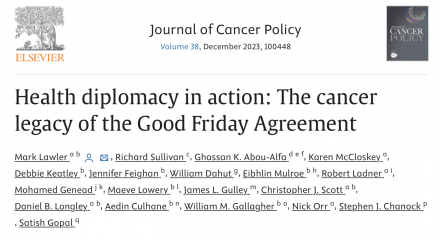All-Island Study Highlights the Cancer Legacy of the Good Friday Agreement
New all-island research led by Queen’s University Belfast highlights the health and economic impact of the Good Friday Agreement on cancer across the island of Ireland in the last 25 years.
The work, involving researchers from Northern Ireland, Ireland, the UK and the U.S. has been published today in the Journal of Cancer Policy, the number one cancer policy journal globally.
The study highlights the impact of the Ireland – Northern Ireland – U.S. National Cancer Institute Cancer Consortium, the brainchild of former Queen’s Professor and Vice Chancellor Patrick Johnston.
The Consortium is a unique partnership, established in 1999, between the governments of Ireland, Northern Ireland and the U.S., as a direct result of the Good Friday Agreement. The study shows how the Consortium acted as a catalyst, enhancing cancer research quantity and quality both between researchers in Northern Ireland and Ireland and with premier institutions in the U.S., leading to improved cancer outcomes on the island of Ireland.
The study highlighted a 550% increase in the quality of joint cancer research on the island, an economic dividend of that enhanced research leading to an increase in university spin-out activity and an improvement in cancer outcomes on the island of Ireland.
Lead Author Professor Mark Lawler, Professor of Digital Health at Queen’s and co-lead of the All-Island Cancer Research Institute (AICRI) said: “This research highlights the significant cancer legacy that the peace process and the Good Friday Agreement have delivered for people from all parts of this island. This unique partnership has been truly transformative, saving thousands of lives and driving significant research and innovation that will have both health and economic impact for this island.”
Professor Lawler recently presented the research at the Science Summit of the UN General Assembly, where it was highlighted as a global exemplar of successful health diplomacy.
U.S. Special Envoy for Northern Ireland Economic Affairs Joseph Kennedy III, leading a US business delegation to Northern Ireland said: “I highlighted this work at the BIO International Convention in Boston earlier this year. It demonstrates how a transatlantic partnership, fostered through the Good Friday Agreement, can drive a research and innovation agenda that delivers tangible benefits for people and societies on the island of Ireland. The potential health and economic benefits for Northern Ireland are significant, aligning with initiatives such as the Belfast Region Growth Deals.”
Co-author in the study and patient advocate Debbie Keatley added. “This work shows how much the cancer research landscape has changed in the last twenty-five years. The work of patients and advocates no longer exists on the margins. They are taking their rightful place as equal partners in this endeavour; in the rooms and at the tables where decisions are made about research and treatments that affect them.
“Groups like Patient Voice in Cancer Research and Northern Ireland Cancer Research Consumer Forum are working together with researchers, all focused on a single aim – to improve cancer outcomes for people across Ireland and beyond. The learning is clear; when you truly want to make progress, make space at the table for patients.”
Doctor Satish Gopal, Director of the Centre for Global Health at the NCI and senior author on the study said: “We are delighted to have been a partner in this work over the last 25 years. This research exemplifies how by collaborating together across borders, we can achieve transformative change. Cancer is a global challenge and initiatives such as this point the way forward.”
Professor William Gallagher, Professor of Cancer Biology at University College Dublin, Co-Lead of AICRI and co-author on the study said: “Working together in a shared partnership, AICRI and the Ireland-Northern Ireland US-NCI Consortium can deliver high quality research that directly translates into patient benefit across the island of Ireland.”
Professor Robert Ladner, CEO & Founder of N.I spin-in drug development company CV6 Therapeutics and co-author on the study said: “Relocating CV6 Therapeutics from Los Angeles, California to Belfast, Northern Ireland, would not have been possible without the Good Friday Agreement and the vision of Paddy Johnston. We are delighted to be a part of this ongoing work and are dedicated to developing new value-based medicines on the island of Ireland for cancer patients globally.
Professor Lawler added: “To paraphrase our dear departed friend Paddy Johnston, – “Dream no little dreams, for they stir not the hearts of men nor women”. “We need to be bold; we need to be ambitious and, most of all, we need to work together to address one of the greatest challenges in human health. Cancer knows no Borders – let’s not shirk our global responsibility.”

